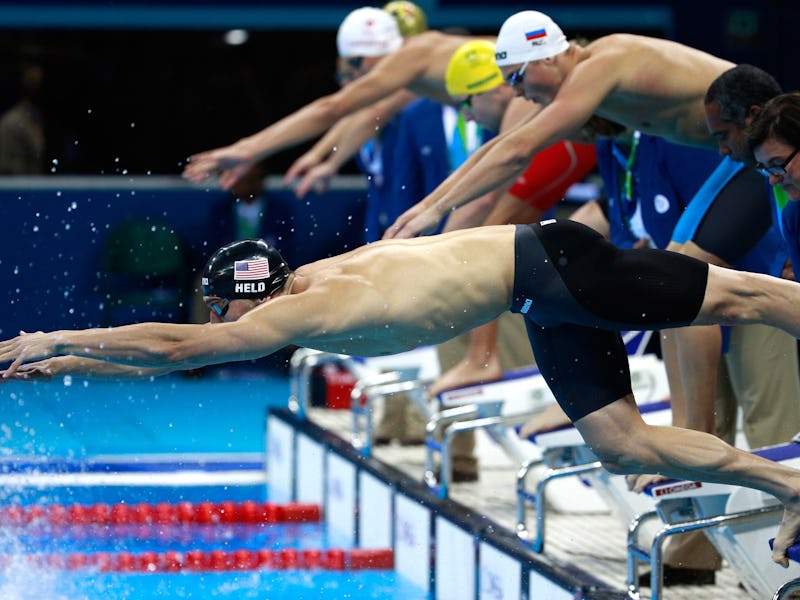Do Olympic Virgins Have Beginner’s Luck?
Whether or not it's real, believing in the phenomenon could still bring home the gold.

Over half of Team USA are virgins — Olympic virgins, that is.
Of the 554 American athletes competing in Rio de Janeiro, 365 are attending the Games for the first time. While all athletes that bring home medals are lavished with praise, those that win during their Olympic debut are imbued with a certain sort of magic we call beginner’s luck. Some of this year’s virgins, like gold-winning sharpshooter Virginia Thrasher and swimmer Ryan Held, seem to have demonstrated the existence of the phenomenon, which attempts to explain why noobs seem to be disproportionately successful.
But what is beginner’s luck, really? Numerically speaking, it’s not much of anything, according to Drexel University School of Public Health biostatistician Edward Gracely, Ph.D., who explained to Inverse that beginner’s luck is a figment of the mind rather than a statistical phenomenon. But just because it’s all in our heads doesn’t mean it’s not incredibly influential, he says. In fact, we might be even more powerful because of it.
“Why do people think there’s beginner’s luck?” he asks. “Do you remember the person who played something the first time and just did average? No, you remember the person who tried something for the first time and did exceptionally well. It stands out. It’s unusual, so people remember that.”
Team USA sharpshooter and Olympic first-timer Virginia Thrasher won a gold medal in the 10m Women's Air Rifle competition.
When the Ryan Helds and Virginia Thrashers of the athletic world bring home medals after their first Olympics, we pay attention. Of course, we’ll probably pay attention if they bring home medals from the 2020 Tokyo Olympics, too. But not as much — nothing quite thrills audiences like the success of a first timer. An Olympic virgin achieving sudden, seemingly unprecedented success appeals to us in the same way young Hollywood ingenues or child geniuses might, implying that there’s some sort of real, palpable advantage to being a beginner. It suggests, in a sense, the existence of some kind of magic: Here’s this novice, who’s never competed at this level, that, by some quirk of genetics or twist of fate, is somehow better than everyone else.
That magic may have a greater effect on the athlete than it does on the people watching. After all, nothing motivates an individual to continue training like initial success. “If somebody plays a game for the first time, and they do really well, then they get motivated to keep playing that game,” Gracely says. “Whereas, if they play the first time and then flub up totally, they may give it up.”
There’s a much higher chance that a person who experiences initial success will go on to improve their skills to achieve even more down the line. The idea is reminiscent of one explanation sports psychologist Sam Sommers gives for the existence of very attractive NFL quarterbacks in This Is Your Brain On Sports. The Tom Bradys of this world aren’t necessarily born footballers, but because they’re assumed to be more highly skilled at a young age because they’re good looking, there’s a higher likelihood they’ll wind up better at their sport than their average-looking peers.
Olympic virgin Ryan Held won gold in the 4x100 freestyle relay on Sunday.
Could Olympics virgins be performing better because they’re not under as much pressure? It’s a possibility, but Gracely isn’t convinced: If anything, he says, the pressure would be greater for first-timers. “It’s not like, ‘Oh, you’re only a beginner, nobody’s expecting you to do well,’” he says. “This is your only possible chance you’re ever going to be here, damn it, you better do well!”
Of course, he explains, no one’s been able to quantify whether an Olympic first-timer actually feels more stressed about winning than a third-timer, so determining whether pressure — and if so, what type — really plays a role in beginner’s luck remains a scientific mystery.
But whether we’re talking about an Olympic virgin or a kid winning her first-ever 100-meter dash, Gracely reminds us that the phenomenon is a mere bias of the mind. We see it as beginner’s luck because the converse — beginner’s failure — simply has no name. It’s just a failure.
And nobody wants to talk about those.